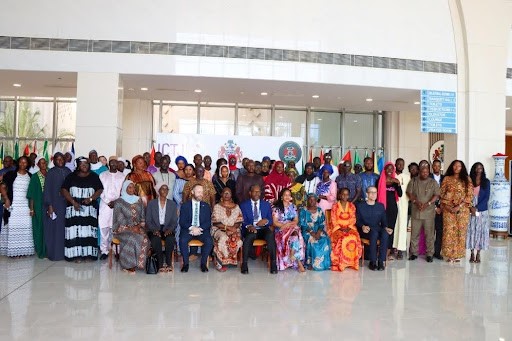By Ndey Sowe
The Ministry of Justice, in collaboration with the International Centre for Transitional Justice (ICTJ), hosted a stakeholder forum on Friday, November 15, 2024, to discuss the establishment of a Special Accountability Mechanism in The Gambia. The event, supported by the Office of Global Criminal Justice, was held at the Sir Dawda Kairaba Jawara International Conference Center.
The forum served as an information-sharing platform to foster dialogue on the Government’s efforts to implement key recommendations from the Truth, Reconciliation, and Reparations Commission (TRRC). Among these recommendations is the creation of a hybrid court to address past human rights violations.
With over 100 participants—including victims, civil society representatives, and members of youth and women’s groups—the forum highlighted the progress and challenges in the transitional justice process.
Solicitor General and Legal Secretary Hussein Thomasi praised the resilience of victims who courageously participated in the TRRC process.
“We are here not only to share updates on our progress but also to engage in meaningful dialogue with you—victims, civil society representatives, and other stakeholders. Your insights and perspectives are invaluable as we work together to foster a transparent, inclusive, and participatory process that promotes public trust in our accountability efforts as a country,” Thomasi said.
Acknowledging the challenges, Thomasi emphasized the importance of collaboration in overcoming misconceptions, enhancing understanding, and strengthening support for the mechanism.
“I urge all stakeholders to recognize the value of this forum and to work together to ensure the voices of those affected by the profound human rights violations and abuses between July 1994 and January 2017 are heard. Together, we have a collective commitment to strengthen our nation’s pursuit of justice and ensure that impunity has no place in The Gambia,” he stated.
Roadmap for Accountability
The TRRC’s 2022 White Paper, which endorsed 263 out of 265 recommendations, called for establishing a Special Accountability Mechanism, including a Special Prosecutor’s Office, a Special Criminal Division of the High Court, and a Special Tribunal. These structures aim to investigate and prosecute the violations highlighted by the TRRC.
Thomasi underscored the government’s progress in this light, noting the passage of the Special Prosecutor’s Office Bill and the establishment of an Independent Selection Panel.
“This office will oversee prosecutorial functions and play a crucial role in restoring public trust in the transitional justice process,” he added.
Voices of Key Stakeholders
Precillia Yagu Cessay, a member of the Gambia-ECOWAS Joint Technical Committee, emphasized the need for effective resource allocation to implement transitional justice mechanisms.
“Prosecutions, criminal accountability, and investigations are often key demands of victims seeking justice and accountability from those responsible for their suffering. However, challenges in resource management and execution remain significant,” she said.
Didier Gbery, ICTJ’s Head of Programs, highlighted the symbolic and practical significance of the hybrid court.
“At this moment of significant transition, The Gambia stands at the crossroads of justice and reconciliation. The establishment of a special accountability mechanism and the intended creation of an internationalized hybrid court are vital steps. These mechanisms not only address past atrocities but also reinforce the rule of law, foster national healing, and ensure that future generations can live in a society founded on human rights, democracy, and justice,” Gbery noted.




















